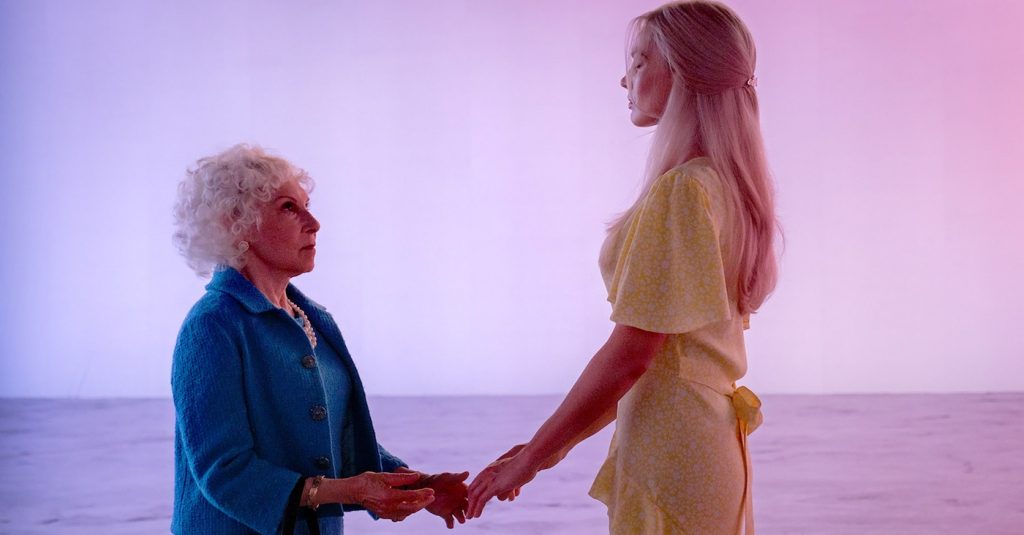Best of 2023: Hit Makers Mark Ronson and Andrew Wyatt on Adding a Pop Punch to “Barbie” Soundtrack
*It’s our annual “Best of the Year” look back at some of our favorite interviews from the year.
Before Barbie, before producing Bruno Mars and Adele, before winning an Oscar for co-writing Lady Gaga’s duet “Shallow” for A Star Is Born, Mark Ronson made a living in New York City as a deejay pulling from his encyclopedic knowledge of musical genres from many eras. Ronson’s talents earned wide acclaim when he co-produced Amy Winehouse’s breakthrough album “Back to Black” in 2006. Since then, Ronson and his frequent collaborator Andrew Wyatt have gained a reputation as studio-savvy hitmakers in collaboration with a wide range of high-wattage talent.
So it made perfect sense when filmmaker Greta Gerwig enlisted Ronson and “Shallow” co-writer Wyatt to oversee the music for Barbie and its companion “Barbie: The Soundtrack” album. Together, they produced the movie’s effervescent tunes featuring pop stars Charli XCX, Nicki Minaj, Haim, Sam Smith, Pink Pantheress, Khalid, and Billie Eilish. The result was 11 Grammy Award nominations.
Speaking from Los Angeles, Ronson and Wyatt talked about their love of 80s-era synths and the experience of being in the recording studio with Ryan Gosling as he belted out Barbie‘s big power ballad “I’m Just Ken.”
You guys usually write and produce songs for pop stars. What’s the difference between collaborating on an album with a singer versus the way you created music for the Barbie movie?
Mark: A lot of time we work with brilliant artists who come in with an idea: “I just broke up with my boyfriend, and I need to get this emotion out” or “I just came up with this funny line,” someone else delivers the inspiration to you. But sometimes you show up at the studio thinking, “What can I possibly say today that I haven’t said before?” When you get a script like Barbie, it’s so emotive; your brain goes to places it never would have gone, and that’s a real gift for a songwriter. As soon as Andrew and I read the script and had our initial conversations with Greta, music started to come out of us.
Greta Gerwig loved her Barbie dolls during the eighties. Did the music from that time period influence your sound?
Mark: Maybe in some ways. With the Cold War still happening, Reagan and so forth, the eighties were kind of the heyday of American triumphalism, so we naturally gravitated to that.
And that eighties synth feel seems to come through in bouncy numbers like “Hey Blondie” and “Speed Drive.”
Mark: 80s synths have never gone away; they just keep evolving in contemporary pop. The eighties mean so many things from Duran Duran to Herbie Hancock’s “Rocket,” but it also means some very rich scores from [film composers] Vangelis and Maurice Jaubert and David Grusin, who were like: “We’ve been using orchestras for 70 years; let’s try something else and see if we can get the same emotive-ness with these other instruments.” Greta loved the emotional wallop and the romance of the orchestra, but she also loved the more synth-y stuff. Andrew and I were just trying to play in this place where we could weave these things together.
Given your collective track record as producers and songwriters, was it an easy sell to get major stars like Dua Lipa, Nicki Minaj, and Billie Eilish on board with Barbie?
Mark: Greta was the easy sell. Especially with younger artists, they’ve grown up with Lady Bird and Little Women so everybody was excited to come to the table because of Greta.
Creatively, what came first?
Mark: Our first marching orders were to write a dance number because they were going to film it soon and were going into choreography rehearsals. With Dance The Night, Andrew and I have both worked with Dua [Lipa], and it seemed obvious: Who else is going to do the killer dance sequence like her? She put her whole boot through the genre of modern disco, so that was really exciting.
It’s incredibly catchy. Who else stands out?
Mark: Well, we didn’t produce every song. On “What Was I Made For?” we just did the string arrangement, but as soon as we heard the first demo from Billy [Eilish], we were like, “Wow, I can’t believe she watched twenty-five minutes of the film and cut right to the heart of Barbie’s experience.”
“I’m Just Ken” has turned out to be the movie’s big showstopper, with Ryan Gosling belting out this emotional power ballad. How did that song come together?
Mark: The Ken character got under our skin as soon as we read the script. Everybody can empathize with the loser. We were just trying to write something that made you feel for this guy, so one day, I was walking to the studio, and I thought of the line, “I’m just Ken; anywhere else, I’d be a ten.” I made a little chorus idea, sent it over to Andrew and he came up with the verse.
Greta Gerwig liked “I’m Just Ken” so much that she rewrote the script to make room for it in the third act. That must have been gratifying.
Mark: Yeah, of course. We’re working with Greta and with [Barbie co-writer] Noah Baumbach, who are kind of comic geniuses with words. So Andrew and I were like, “Oh, they think our words are good enough that we’re not going to ruin their movie if they literally change the entire third act to accommodate this thing.” When they sent us storyboards with our lyrics and a drawing of Ryan on the bed singing, you go, “Oh s***, this is real!”
What’s it like working with Ryan Gosling in the studio?
Andrew: Ryan’s a talented vocalist, so he was easy. I don’t think we did more than a couple of takes. We’ve been doing this stuff a long time, and sometimes, at the end of a session, you go, “Boy, I hope we can make this sound good.” Including my own vocals, I should say. But with Ryan, we just did a few takes, and the sound was already there. We were quite blown away.
Mark: Ryan was in the vocal booth behind this glass window. You don’t want to stare, but I’d look over occasionally and see that he was really far back from the microphone. First rule, producing 101, is to get the singer as close to the microphone as you can so you can go directly to the feeling. But I realized Ryan was singing as if it were both a mike and a camera. He used his whole body, kind of what opera singers did back in the day at Carnegie Hall. Ryan performed that song with every bit of Ken in him.
You recorded him in London?
Mark: Yeah, we went to London because we only had three hours to get this song done in between Ryan’s insane workouts and dance rehearsals. Later, we also recorded the other guys on Skype singing the background, “And I’m enough!” Andrew sang backgrounds, too
Andrew: That was fun.
In addition to all these soundtrack tunes, you also composed the score, which plays underneath that poignant scene when Margot Robbie’s “Barbie” meets Ruth Handler (Rhea Perlman), inventor of the Barbie doll. What were you aiming for in that sequence?
Mark: Greta was like, “I need to be crying here,” so we did probably like seventeen drafts of that thing until we got it right. The music couldn’t get in the way of dialogue, so we used a lot of synths and sound pads to swirl around it, and choirs, and the orchestra, and a glass harmonica, which is this beautiful droning instrument. We knew the emotional crux of the film was in some ways on our shoulders, so on our last pull-out-our-hair night, Andrew sat at the keyboard for the longest time, just watching this scene over and over.

Tweaking the music until. . .
Mark: Tweaking until we were f***ing making ourselves cry.
For more on Barbie, check out these stories:
“Barbie” Casting Directors Allison Jones And Lucy Bevan on Populating Barbie Land
“Barbie” Hair & Makeup Artist Ivana Primorac Conjures Personality From Plastic
Pretty in Pink With “Barbie” Production Designer Sarah Greenwood & Set Decorator Katie Spencer
Featured image: Caption: (L-r) RYAN GOSLING as Ken and MARGOT ROBBIE as Barbie in Warner Bros. Pictures’ “BARBIE,” a Warner Bros. Pictures release. Photo Credit: Jaap Buitendijk



